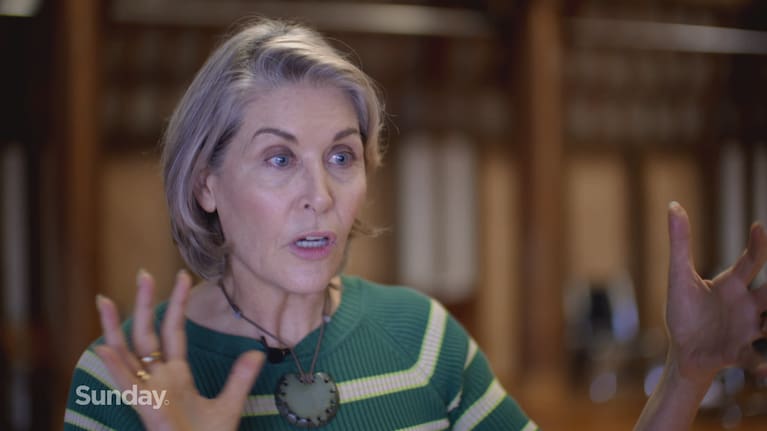The trio are meeting in a bar, a couple and a Stranger.
“What do you think, keen?” the Husband asks his Wife with a raised eyebrow, unsure of her response.
A demure single shoulder shrug, chin down and to the side so she can meet the Stranger’s gaze through soft brown lashes.
“Sure.”
The Stranger’s hand creeps up her Husband’s thigh higher and higher as a room full of acting students lean forward, holding their collective breath while the Stranger and Wife lean across her Husband to kiss, longingly.
Into this prelude to a threesome, smashing the ‘fourth wall’ between actors and audience, comes screen legend Jennifer Te Atamira Ward-Lealand: “Magical, magical – let's bring it back into the room now.”
And just like that the spell is broken.
“I think the kiss is too long. I don't even think it's necessarily a deep kiss. I think it's more kiss. And release. OK, so let's step it back."
“Like a powder?” quizzes the Stranger.
“Yeah,” Ward-Lealand agrees as she folds her legs under herself like origami at a workshop by the The Actors' Program in Auckland.
Creative New Zealand says it's at the limit of what it can support. (Source: 1News)
This is the world where kisses, in fact ANY touching falls into 3 categories - ‘powder’ the lightest, ‘muscle’ - medium pressure and ‘bone’, the firmest.
It is the world of Intimacy Coordination – a reaction to the MeToo movement which pushed back against work-place sexual harassment.
Tough times
Ward-Lealand is one of the first Intimacy Coordinators (ICs) in Aotearoa bringing safer sex scenes to our screens.
That starts by sanitising the language used. "I'm trying to use more de-sexualised language, so sometimes it’s talking about, you know closing a distance, or the quality of the touch, rather than caress or stroke or ‘be sexier’.”
Fellow IC and screen star Tandi Wright recalls several tough times before the practice started when she felt she had been pressured in intimate scenes.
“I was in a US production, in the script it said ‘they went in (to the lake), in their clothes’. My co-star decided he was gonna rip off his top, so he was in his underwear, and then the director was like - well it’s over to you, you can do it, you can not do it.”
It was an uncomfortable situation that only happened because the scene hadn’t been properly scripted and broken down, creating a grey area where the power imbalance between a director and an actor could take hold and thrive.
"It’s just really unfair being put in those positions. Because you feel like a bad actor, if you don’t do it.”
Wright also recalls being asked to insert more graphic material, and wear fewer clothes in an Aussie production, experiences that have caused harm.
"Oh God you go home and cry, absolutely, yes.”

But the work of an IC is to choreograph the intimacy, which starts with the actors checking in on where they consent to be touched. Not just once but every day, and definitely before any scenes involving physical contact.
'Spoil the spontaneity'
Although gaining in popularity, it is not without controversy.
Earlier this year screen legend Sir Ian McKellen, speaking to BBC Radio 4, questioned: “Why can’t it be the director who does that? Why has it got to be somebody who’s been trained in how to do it? This has been a huge change and it’s a little bit of beef for me.”
And in 2022 actor Sean Bean, Sir Ian’s Lord of the Rings co-star warned ICs can “spoil the spontaneity”.
Both prompting fellow Hollywood heavy weight Dame Emma Thompson to defend the practice, saying it’s “absolutely essential” to support young women in particular on sets that are dominated by men.
Ward-Lealand agrees the power imbalance both in front and behind the camera must be rectified.
“There’s this sort of myth that perhaps only improvisation, or just letting the actors go for it, will create chemistry. It’s a complete myth, you can create chemistry, you can choreograph chemistry.”
For Wright, who alongside Ward-Lealand has helped pioneer the work of ICs in Aotearoa, it’s about keeping everyone on set safe, including the crew, which ultimately brings out the best in the performance.
“Oh I just feel like it’s us growing up. It’s us saying this is a legitimate part of our work, let's make it safe.”



















SHARE ME